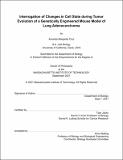Interrogation of Changes in Cell State during Tumor Evolution of a Genetically Engineered Mouse Model of Lung Adenocarcinoma
Author(s)
Cruz, Amanda Margarita
DownloadThesis PDF (7.692Mb)
Advisor
Jacks, Tyler
Terms of use
Metadata
Show full item recordAbstract
In genetically engineered mouse models of lung adenocarcinoma (LUAD), tumors become more heterogeneous and dysregulate cell identities as they progress and evolve. In this thesis, single-cell RNA-sequencing technology was utilized to understand dynamic changes that occur during tumor evolution both with respect to tumor cells and tumor-specific cytotoxic CD8 T cells. In tumor cells, expression of Etv4 and Etv5, which belong to the Pea3 family of transcription factors, vary as a consequence of tumor progression. Etv5 regulates the identity of the cells that give rise to KP tumors, and its expression is lost as tumors evolve. Conversely, Etv4 is not expressed in the adult lung, but becomes latently expressed in aggressive tumors. Interestingly, we find that both Etv4 and Etv5 are required for lung tumor initiation. In addition, we also profile CD8 T cells that specifically recognize experimentally defined tumor neoantigens and provide evidence for an antigen dominance hierarchy that creates competition between T cell responses to tumor neoantigens. Critically, we find that this hierarchy influences the functionality of CD8 T cells and describe novel differentiation trajectories that distinguish subdominant and dominant antigen responses. Together, findings from these studies were used to propose analytical methodologies to model tumor evolution.
Date issued
2021-09Department
Massachusetts Institute of Technology. Department of BiologyPublisher
Massachusetts Institute of Technology